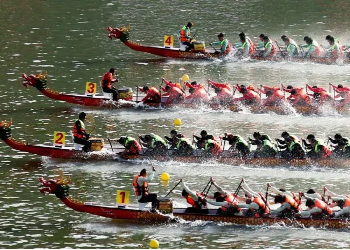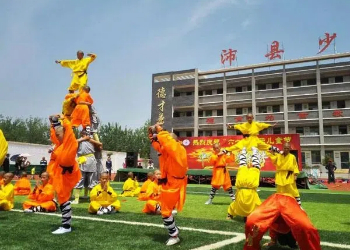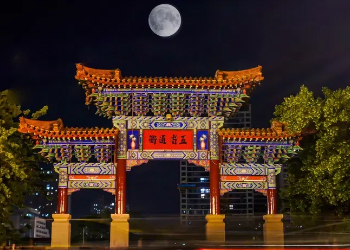The folk culture of Jiangsu Province, akin to its geographical landscape, exhibits a blend of northern and southern characteristics while preserving the unique traditions of various regions. The Yangtze River, this mother river of China, divides Jiangsu into its northern and southern halves. The south is predominantly based on rice farming, while the north relies on dry farming. This geographical disparity has led to differences in the folk cultures of the north and south.
Differences in North-South Customs in Jiangsu
 The dragon boat races
The dragon boat races
In southern Jiangsu, rice farming is the primary mode of production. The cultivation of rice has not only nourished the land but also deeply influenced the lifestyle and cultural traditions of the locals. People in the water towns of the south lead a relatively peaceful life, accustomed to a slow pace, enjoying tranquility and leisure. In terms of diet, southerners have a preference for sweet foods, evident in their daily dishes, snacks, and tea drinks. The sweetness is neither too much nor too little, perfectly matching the gentle disposition of the southern water towns. Tea tasting is an important part of southerners’ lives; a pot of good tea and a few plates of delicate snacks suffice to savor the beauty of life. Suzhou gardens, as outstanding representatives of southern garden art, showcase the refinement and delicacy of southern culture through their ingenious layouts and meticulous carvings. Yangzhou culture, meanwhile, interprets the profound heritage of southern culture with its unique gardens, cuisine, and handicrafts.
The Dragon Boat Festival customs in Suzhou, such as dragon boat races, eating zongzi (rice dumplings wrapped in bamboo leaves), and hanging mugwort, as well as the Lantern Festival on the Qinhuai River in Nanjing, vividly reflect the deep love and inheritance of traditional culture in the south.
 The Martial Arts in Peixian County
The Martial Arts in Peixian County
In contrast, northern Jiangsu presents a starkly different landscape. Dry farming is the main mode of production here, with crops like wheat and corn being cultivated. This leads to a relatively rugged lifestyle and a straightforward, bold personality among the people. In terms of diet, northerners prefer spicy foods, which align with their forthright nature, and their habit of enjoying alcohol is a vivid portrayal of their hospitality and love for making friends. The folk dances of Xuzhou, such as lion dancing at Yunlong Lake and martial arts in Peixian County, exhibit the unique charm of northern culture through their rugged, bold, and magnificent performance styles. The Zaohe Temple Fair in Suqian attracts numerous tourists with its rich variety of folk activities and lively atmosphere.
Furthermore, the Qiantong Boat Gathering in Jiangyan, a unique folk water activity, demonstrates the diligence, wisdom, and love for life of the people in the northern Jiangsu water towns. Every year during the Qingming Festival, hundreds of boats gather, with elevated boat heads and colorful flags flying. Accompanied by exciting drumbeats and cheers, it showcases the spirit of unity, cooperation, and courage of the water town people.
Multicultural Integration in Jiangsu
The folk culture of Jiangsu Province not only exhibits significant differences between its north and south but also displays a vibrant tapestry of multicultural integration and collision across a broader spatial scope.
 The Hub of Five Waterways
The Hub of Five Waterways
Located at the estuaries of the Yangtze River, the ancient Yellow River, and the ancient Huai River, Jiangsu’s unique geographical position has earned it the reputation of being a “hub of five waterways.” The mighty eastward flow of the Yangtze River, the nourishment of the Yellow River and Huai River, and the connection of the Grand Canal have made Jiangsu a pivotal water transportation hub and an important platform for cultural exchanges. On this land, different cultural genres and customs converge and blend, forming the unique diversity of Jiangsu's folk culture.
In terms of folk culture, Jiangsu lies in the eastern part of the Yangtze River basin's cultural circle. Here, it has not only inherited the gentle, delicate, and refined cultural traditions of the Yangtze River basin but also continuously absorbed new cultural elements from exchanges with other regions, enriching and developing its own cultural connotations. In the north, Jiangsu has been influenced by the honest and scholarly atmosphere of the middle and lower reaches of the Yellow River. The folk culture here retains the boldness and frankness of northern culture while incorporating the delicacy and gentleness of southern Jiangnan culture, forming a unique “north-south blend” style. In the west, Jiangsu inherits the mystical charm of Chu culture, giving new interpretations and transmissions to its mystery and romance. In the south, Jiangsu interacts with the lively and enigmatic folk customs of the Baiyue people, adding more vitality and color to Jiangsu's folk culture through the Baiyue culture's warmth and openness.
This multicultural integration is not only reflected in Jiangsu’s customs, festivals, folk arts, and other aspects but also profoundly influences the thinking patterns, aesthetic tastes, and lifestyles of Jiangsu people. In Jiangsu, you can witness the coexistence of the gentleness of the southern water towns and the boldness of the northern plains, the intertwining of Chu culture’s mystery and Baiyue culture’s warmth, and the fusion of Confucian etiquette and Taoist naturalism. This multicultural integration has endowed Jiangsu’s folk culture with both deep historical roots and a modern atmosphere and innovative spirit.
In future development, Jiangsu should continue to promote this spirit of multicultural integration, strengthen cultural exchanges and cooperation with other regions, and make Jiangsu’s folk culture a bridge and tie connecting different cultures and promoting cultural diversity. At the same time, it should also focus on protecting and inheriting Jiangsu’s traditional cultural heritage, letting this precious heritage shine more brightly in the context of the new era. Only in this way can Jiangsu’s folk culture stand out uniquely in the global cultural family and become a shining pearl in the treasure trove of Chinese culture.
Jiangsu’s folk culture is a colorful painting that not only showcases the lifestyles and values of Jiangsu people but also constitutes an important part of traditional Chinese culture. Both the differences in north-south customs and the multicultural integration constitute the unique charm of Jiangsu’s folk culture, attracting people from around the world to explore and experience it.



































